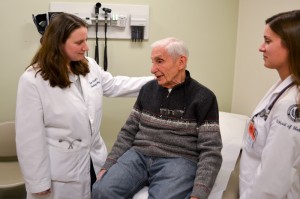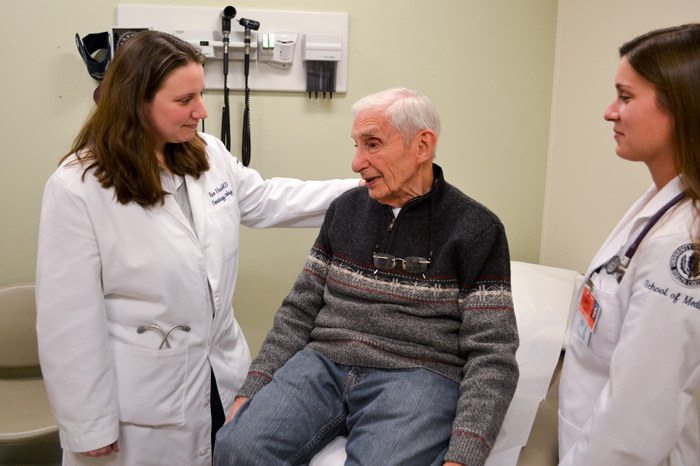The Bioscience Connecticut initiative is, among other things, an investment in the future of health care in the state. Physical upgrades to the UConn Health Center campus and the expansion of class size will enable the UConn Schools of Medicine and Dental Medicine to train more physicians and dentists, creating a greater pool of talent available to serve Connecticut’s growing health care needs.

The career path of Dr. Karen Hook, hematologist/oncologist in the Carole and Ray Neag Comprehensive Cancer Center, is an example of this academic mission: a Connecticut native who graduated from the UConn School of Medicine and then returned to the UConn Health Center to practice, serving Connecticut patients and helping train tomorrow’s physicians.
Hook grew up in Plainville, graduated from Plainville High School in 1997, and went to UConn on a Nutmeg Scholarship, a highly competitive merit award for Connecticut high school seniors. She graduated with a Bachelor of Science in chemistry in 2001, then went from Storrs to Farmington for medical school. In 2005, now with an M.D. from UConn, she went to the University of Pennsylvania for her residency and fellowship training. She rejoined the UConn Health Center as a clinician and assistant professor of medicine in 2011.
She shared her story with UConn Today:
At what point did you decide medical school was the path you were going to take?
I think in high school and in early college, when I knew that I liked science, but I wanted to find some way to apply that to people, and I thought that medicine was a way to bridge that gap.
I volunteered here [at the UConn Health Center] when I was in high school, on the oncology unit, on the old bone marrow transplant unit. I still remember that. It looks exactly the same. I think I always knew that I would end up in oncology, and just every step along the way at UConn, from my experiences in college, coming here for medical school, volunteering here, I just got more and more into it and knew that it was the right choice and that this was the right place.
Now that you’re in a faculty position here, what’s it like to be on the other side of the student-teacher relationship?
It’s neat because I have the perspective of being the student, and now being one of the instructors, so I can understand what the students are thinking and tailor the teaching to that. Hopefully it enhances the way we teach the course if I can provide that perspective to the other faculty.
As a second-year I took a class called Principles of Clinical Medicine, PCM, which is basically where how you learn how to be a doctor: You learn how to relate to patients, you learn how to perform the mechanics of the physical exam. Then when I became a fourth-year, I taught it. I was part of a group as a senior medical student and joined a group of second-years to facilitate, along with the professors of the class. And now they keep doing that. Every year, they have a fourth-year medical student, and now that I’m back here as an assistant professor, I teach in that class. That’s been incredible, that I get to come back and give back to the community that took care of me as I was coming up. Now I get to be one of the leaders or teachers in this class.
What about your experience as a UConn medical student do you feel helped prepare you to be the doctor you are today?
One of the reasons I chose UConn medical school was the clinical skills assessment program—Carol Pfeiffer and Lynn Kosowicz were the pioneers of this program. Patient instructors come in and interact with the students in an office-like setting and report symptoms and have physical exam findings. It’s a way to practice patient interactions in the doctor-patient relationship. That wasn’t offered at any of the other medical schools I looked at and interviewed, and that’s what really made me want to come here. I think the book learning, you can get anywhere, but the human interaction is something that we really develop in the students here, and we still do. I carry that with me every day I practice, the skills that learned in that course.
What would you tell a prospective UConn medical student is the most compelling thing about coming here?
This is a great place to get an education. There are many resources here at your disposal. Take advantage of all the opportunities, because you will find and be surprised at how often these things come up in your practice, and every day I remember something that I learned here that I can apply to good patient care.
After your fellowship, was it always your intention to come back?
It was like medical school, that I cast a broad enough net to see what was out there and to look at a lot of different places. But my mom was right. She told me that when I left; when I went to Pennsylvania, she said, “You’ll see, you’ll come back,” and I tell people that now, that my mom was right, and I would want to come home.
Family of course is one part of it, but did you feel a loyalty to the University?
Right, especially because of the Nutmeg Scholarship initially, and my undergraduate training, and the experience that I had in medical school. I thought that was true, I had that thought when I was moving and coming back here. And now that I’m actually here and living it, it just gets more and more rewarding every day. It actually is rewarding to come back to the place that raised you. I didn’t realize that when I came to the place where I grew up that I would become the caregiver for so many people who I knew.
Is it more rewarding to you to be able to serve patients from where your roots are?
Yes, because I feel a connection. I just feel like it’s important to give back.
How would you describe your role today, as part of the UConn Health Center clinical faculty?
I see patients in the Neag Comprehensive Cancer Center with hematologic diseases: all types of blood cancer, including leukemia, Hodgkin’s disease, lymphoma, MDS (myelodysplastic syndromes), and benign blood disorders, such as anemia, blood clotting and abnormal bleeding. That’s primarily what I do. And I also spend a majority of my time teaching in the medical school: lectures, conferences, small-group discussions, for all years, 1, 2, 3, and 4. I try to do as much of that as I can.
From your perspective as someone who’s been around this place for a while and have seen how things have evolved, what kind of promise do you see Bioscience Connecticut bringing to the academic mission here?
I think it can only help us. It’s a great opportunity to bring in researchers or to inspire students to take such an active role in research that we really need to advance medical science. I think this will make UConn more competitive, in a good way, that we can continue to attract the best and brightest students here, that we can have an attractive program, and help UConn stand apart as I think it deserves to.
It’s nice to have that trust from state leaders and the public, because it means we’re doing our job, that we can instill confidence from the state and from the governor, that he can see that we really have something special here.
What would you say is the best-kept secret about the UConn Health Center?
UConn does a lot of things well. They produce educators and clinicians and researchers; larger institutions tend to focus on one thing. It’s neat that we have such a diverse student body and faculty that we can really do many different things well, and so students coming here have each of those avenues to explore and determine their own career path.
Follow the UConn Health Center on Facebook, Twitter and YouTube.



